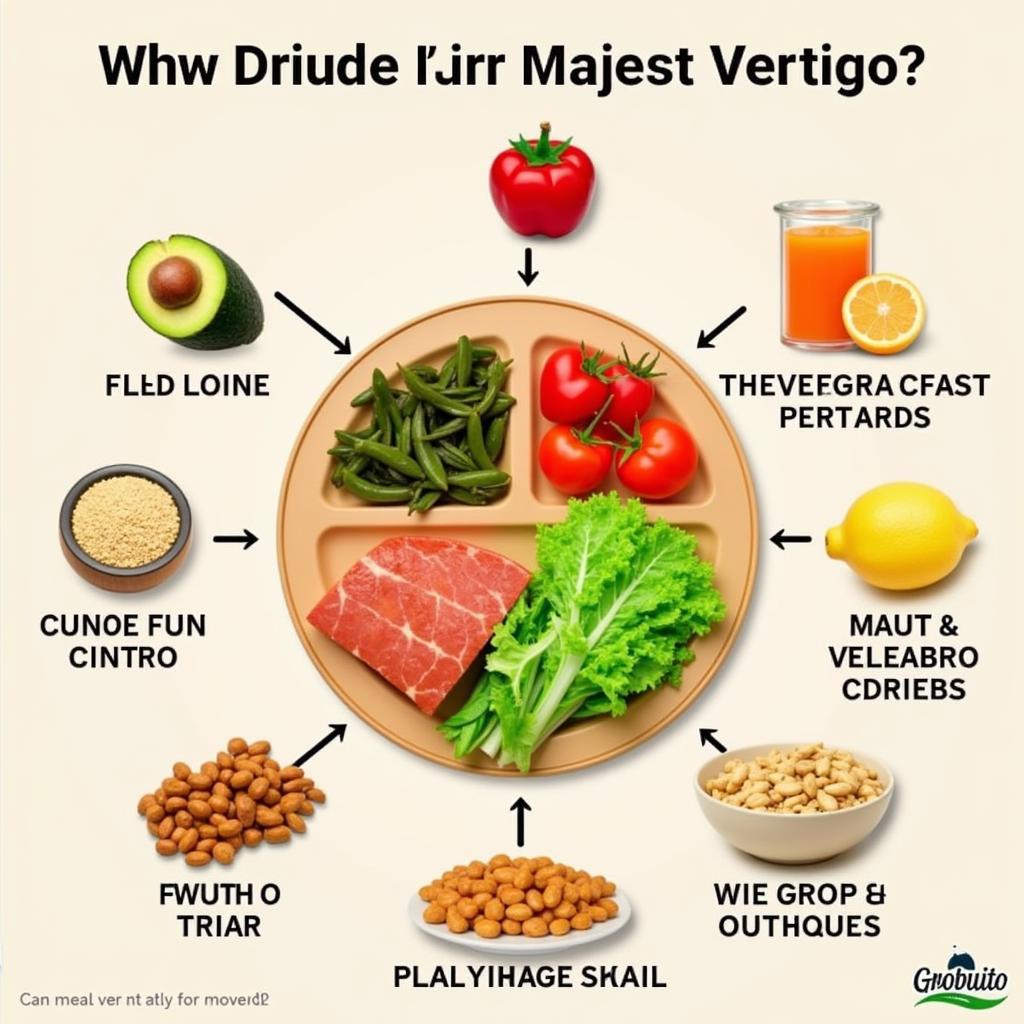Vertigo, a sensation of spinning or dizziness, can be triggered by various factors, and diet is one of them. While not a direct cause, certain foods can exacerbate vertigo symptoms in susceptible individuals. Understanding the connection between what you eat and your vertigo episodes can be key to managing the condition. Let’s delve into the world of Foods That Can Cause Vertigo, exploring what to avoid and why.
 Foods That Trigger Vertigo
Foods That Trigger Vertigo
The Vestibular System and Dietary Triggers
Before we delve into specific foods, it’s helpful to understand how our body regulates balance. The vestibular system, located in the inner ear, plays a crucial role in maintaining our equilibrium. When this system is disrupted, whether by inner ear problems, migraines, or certain dietary triggers, vertigo can occur.
So, how do foods come into play? Certain substances in food can affect the fluid levels and pressure within the inner ear, interfering with the vestibular system’s delicate balance. Additionally, foods that cause blood sugar fluctuations or constrict blood vessels can also contribute to vertigo.
Common Culprits: Foods That Can Aggravate Vertigo
1. High-Sodium Foods:
Excess salt intake can disrupt the fluid balance in your inner ear, potentially leading to vertigo.
- Examples: Processed foods, canned soups, salty snacks, soy sauce
2. Aged and Fermented Foods:
These foods contain tyramine, an amino acid that can trigger headaches and, in some cases, vertigo.
- Examples: Aged cheeses (cheddar, blue cheese), cured meats (salami, pepperoni), sauerkraut, fermented soy products
3. Alcoholic Beverages:
Alcohol is a known diuretic, meaning it increases urine production and can lead to dehydration. Dehydration can affect the fluid balance in the inner ear and trigger vertigo. Alcohol can also directly affect the cerebellum, the part of the brain responsible for balance.
- Examples: Wine, beer, liquor
4. Caffeine and Nicotine:
These stimulants can constrict blood vessels, including those in the inner ear, potentially reducing blood flow and contributing to vertigo.
- Examples: Coffee, tea, energy drinks, cigarettes
5. Foods High in Histamine:
Histamine is a chemical that plays a role in allergic reactions. While some people experience vertigo as a symptom of food allergies, certain foods naturally high in histamine can also trigger it in others.
- Examples: Spinach, tomatoes, fermented foods, smoked fish, shellfish
6. Foods with MSG (Monosodium Glutamate):
MSG is a flavor enhancer commonly added to processed foods. It’s a known trigger for headaches and migraines in some individuals, which can be accompanied by vertigo.
- Examples: Chinese takeout, processed snacks, canned soups
Navigating Your Diet with Vertigo
While the foods listed above are common culprits, it’s important to note that dietary triggers for vertigo can vary from person to person.
“It’s not about eliminating all these foods completely but rather identifying your personal triggers through observation and potentially working with a healthcare professional or registered dietitian,” says Dr. Sarah Jones, a certified neurologist specializing in vestibular disorders.
Keeping a food diary can be incredibly helpful in identifying patterns between your diet and vertigo episodes.
Tips for Managing Vertigo Through Diet
- Stay Hydrated: Drink plenty of water throughout the day to maintain fluid balance.
- Eat Regular Meals: Avoid skipping meals, as blood sugar fluctuations can contribute to vertigo.
- Limit Alcohol Intake: If you choose to drink alcohol, do so in moderation.
- Be Mindful of Caffeine and Nicotine: Reduce your intake or avoid them altogether.
- Consider a Low-Histamine Diet: If you suspect histamine intolerance, consult with a healthcare professional or registered dietitian.
 Healthy Diet for Vertigo
Healthy Diet for Vertigo
Remember, managing vertigo often involves a multifaceted approach, with dietary modifications being just one piece of the puzzle. If you experience persistent or severe vertigo, it’s essential to consult with a healthcare professional to rule out any underlying medical conditions.
Frequently Asked Questions
1. Can certain foods cure vertigo?
While no specific foods can cure vertigo, making dietary modifications and adopting a healthy lifestyle can help manage symptoms and reduce the frequency of episodes.
2. Can food allergies cause vertigo?
Yes, food allergies can trigger vertigo in some individuals. If you suspect a food allergy, it’s crucial to consult with an allergist for testing and personalized management strategies.
3. Is it necessary to avoid all the foods listed above if I have vertigo?
Not necessarily. Dietary triggers for vertigo are individual. It’s essential to identify your personal triggers through observation and, if needed, seek guidance from a healthcare professional or registered dietitian.
Need Help Managing Your Vertigo?
At Mina Cones Food, we understand the impact that diet can have on your well-being. If you’re struggling with vertigo and need personalized guidance on dietary modifications, don’t hesitate to reach out. Our team of experts is here to support you on your journey to better health. Contact us at 02437655121 or email us at minacones@gmail.com. You can also visit us at 3PGH+8R9, ĐT70A, thôn Trung, Bắc Từ Liêm, Hà Nội, Việt Nam. We offer 24/7 customer support.